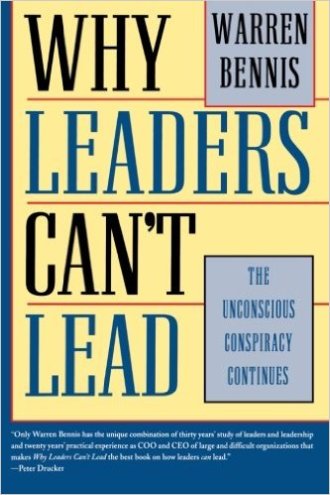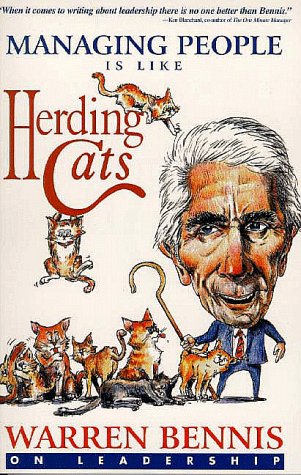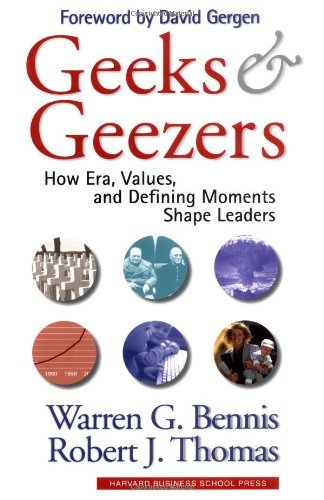Early Life & Education
Career
USC Professor and Leadership Author
The Art and Adventure of Leadership
Personal Life
Early Life & Education

Warren G. Bennis was born in New York City on March 8, 1925 and grew up in Westwood, New Jersey, before his father moved the family to Los Angeles. Following his graduation from Dorsey High School and the outbreak of World War II, he joined the U.S. Army in 1943. Serving as one of the youngest platoon leaders in Europe, he was awarded both the Purple Heart and Bronze Star.
A fellow soldier recommended Antioch College in Ohio, where Bennis enrolled following the war. A first generation college student, he earned a bachelor’s degree in psychology and business in 1951. Bennis was later an honorary member of the Antioch College Board of Trustees.
Under the mentorship of Antioch College President Douglas McGregor, he applied to the Massachusetts Institute for Technology (MIT) for postgraduate studies after receiving an honors certificate from the London School of Economics in 1952. At MIT he completed his doctorate in Economics and Social Sciences; studying under Paul A. Samuelson, Franco Modigliani and Robert M. Solow, all of whom were later awarded the Nobel Prize in economic science.
Career
Following the completion of his Ph.D. in 1955, Bennis immersed himself in establishing leadership as an academic field and spent time teaching at MIT, Harvard University, and Boston University, while chairing the Organizational Studies department at MIT. He also taught at the Indian Institute of Management Calcutta (IIMC), INSEAD, and the Institute for Management Development (IMD) in Lausanne, Switzerland. He is known for advancing the idea that successful leaders demonstrate integrity, compassion, and a capacity for both collaboration and inspiration.

In 1967, Bennis sought to move from theory to practice, accepting the appointment of Provost and Executive Vice President at the State University of New York (SUNY) at Buffalo, a position he held for four years. His tenure at SUNY Buffalo occurred during the height of a turbulent era punctuated by student protests for free speech and an end to the Vietnam War, and a campus occupied by state troopers. His book “The Leaning Ivory Tower” (1973) was largely based on his experiences at Buffalo.
Bennis left SUNY Buffalo to serve as the 22nd President of the University of Cincinnati from 1971 to 1977. Through his leadership, the university successfully transitioned from a municipal university to a major research-oriented comprehensive university and a member of the University System of Ohio. While President at University of Cincinnati, he wrote two books on the academic world and leadership: “The Leaning Ivory Tower” (1973) and “The Unconscious Conspiracy: Why Leaders Can’t Lead” (1976).
Both SUNY Buffalo and the University of Cincinnati awarded honorary degrees to Bennis in 2007. In total, he received honorary degrees from 15 institutions.
Over several decades, Bennis was a consultant to U.S. Presidents John F. Kennedy, Lyndon B. Johnson, Gerald R. Ford, and Ronald Reagan, and was sought out by generations of business leaders.
A heart attack in 1979 during an academic conference in England sidelined him for three months of recuperation. After returning to the United States he joined the University of Southern California (USC) as a business professor.
USC Professor and Leadership Author

Returning to the West Coast and to his earlier career of teaching, writing, and consulting, Bennis spent the next 35 years at USC. Already an accomplished academic and transformative leader, Bennis did not “slow down” and rest on his laurels upon arriving at USC. The majority of his 30 published books were written or co-written during his time at USC along with hundreds of essays and articles. His seminal work “On Becoming a Leader” was published in 1989. The book was re-issued for its 20th anniversary in 2009, and has been translated into 21 languages.
At USC, he continued to consult with business leaders and served on various USC committees; from search committees for USC President, Deans, and chaired professors, to committees reviewing everything from undergraduate education to faculty appointments and promotions. He was ultimately honored with the titles of Distinguished Professor and University Professor at USC. In 1991, Bennis was founding chairman of the USC Leadership Institute at the now Marshall School of Business at USC. The institute was the first of its kind at an American university and became a model for more than 15 other centers around the country, including one at Harvard.
In addition to his posts at USC, Bennis served as chairman of the Advisory Board of the Center for Public Leadership at Harvard University’s Kennedy School. He was a visiting professor of leadership at the University of Exeter (UK) and a senior fellow at UCLA’s School of Public Policy and Social Research.Leadership is the capacity to translate vision into reality.
In the ensuing years, Bennis continued to publish books and articles with various co-authors, including the titles shown below. “An Invented Life” (1993) earned him a Pulitzer nomination. His final book, “Still Surprised: A Memoir of a Life in Leadership” was published in 2010. Bennis’ research on leadership, change, and creative collaboration are widely studied around the world.
Bennis’ work is based on the notion that truly inspiring and powerful leadership lies in promoting openness and discussion, and allowing room for others to shine. The foundation of his work is the importance he placed on valuing people, and the cornerstone of his legacy is his focus on creating a more human and humane business world.



When you take the meaning out of work, you’re basically taking the soul out of it.
The Art and Adventure of Leadership

From 1996 to 2009, Bennis co-taught with the late USC President Steven B. Sample the hugely popular course MDA-365, The Art and Adventure of Leadership. The course was offered to USC undergraduates each spring with hundreds of applications for the coveted 45 seats. The course was demanding, not only in dealing with difficult concepts, but in terms of the work required (more than 1,000 pages of reading, and weekly written assignments in addition to mid-term and final exams), but it created a lasting community of emerging leaders. Alums of the class still keep in touch on Facebook, LinkedIn, and through periodic reunions. For an event honoring Bennis in 2000, then USC President Steven B. Sample summed up the value of his mentoring and collaboration as follows:
HIS MOST ENDURING contribution to the world may be as a coach of other people. Consistent with his philosophy, he draws out the best ideas and gifts of others – students, colleagues and leaders in various realms – and helps mold and shape those ideas. He has taught me much about the history and practice of leadership and has helped me find and articulate my own ideas about this subject. Moreover, his coaching has made me a better leader of this university.
At a recent USC Marshall School of Business symposium honoring Warren, I was struck by the number of dignitaries from around the world who had cleared their schedules to come to Los Angeles to pay tribute to him. It reminded me that there are persons whom we honor because they are important, and there are persons who we honor because we’re grateful for the way they have touched our lives. But Warren Bennis is both – a very important person who has profoundly enriched the lives of thousands of men and women around the world.
-Steven B. Sample
Personal Life
Warren Bennis passed away on July 31, 2014 at a hospital in Santa Monica, California due to complications from pneumonia. He was 89. Numerous tributes were published from the NY Times, the Washington Post, and Forbes Magazine, as well as the universities where he had studied, taught, and lead (Antioch University, MIT, SUNY Buffalo, University of Cincinnati, Harvard University, and USC).
He was survived by his wife, Grace Gabe; his adult children Katherine, John, and Will; and grandchildren Luke and Anya Movius, Devin Bennis, Daniel, Adam, and Hanna Bennis; and stepdaughters Nina Freedman and Eden Steinberg; and step-grandchildren Nathan and Oliver Muz and Eliana and Abraham Freedman.